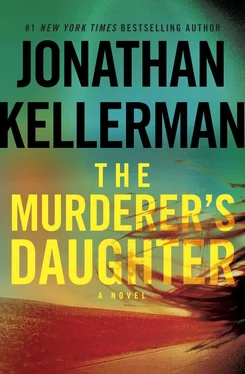Dividing the magazines, they beelined to the house with Grace leading, Malcolm and Sophie trailing as they curtailed their strides to avoid trampling Grace’s heels.
Grace had no idea what they were thinking but she was thinking: He introduced us. So she didn’t know my name before.
So he never told her about me.
Was that because he didn’t talk about fosters?
Or Grace wasn’t that important to him?
It was like he’d read her mind because the next time he showed up, a week later, he said, “Enjoying the psych stuff?”
“Yes.”
“Sophie really enjoyed meeting you.”
Grace lied. “I enjoyed meeting her, too.” She had nothing against new people but didn’t think much about them.
When she and Malcolm had settled in the living room to complete the second part of the new picture-story test, he said, “You probably figured this out: I never told Sophie about you because of confidentiality — your privacy. Beyond that, I take what we do seriously, it’s not a topic for casual conversation. Anyway, it’s not about me, you’re the star.”
“Star of what?” said Grace, even though she had a pretty good idea of what he meant. For some reason, she wanted him to talk more.
“Of what we do together, Grace. My goal is to optimize your education.”
Not explaining “optimize.” He was the only person who treated her like she wasn’t stupid.
“I explained — about not discussing you, because I didn’t want you to think you weren’t important. On the contrary, you are, and that’s precisely why I need to guard your privacy. Even though you have no legal right to confidentiality. Know why not?”
“Because I’m a foster?”
Soft brown eyes drooped sadly. “No, but that’s a logical answer. The actual reason is no kids under eighteen have a right to confidentiality, even things they tell psychologists. I think that’s absurd and terribly wrong, Grace. I think we need to respect children a lot more than we do. So I ignore the rules and keep secrets a hundred percent and don’t write things down that kids wouldn’t want written down.”
His words were tumbling out fast. Dots of pink colored his generous cheeks and one hand was a fist the size of a baseball glove.
Grace said, “Respect your elders but also respect your youngers.”
Malcolm stared at her. Broke out laughing. The fist bumped against the tabletop. “That’s brilliant, Grace. May I borrow it so I can sound brilliant?”
“Sure.”
“You’re exactly right. We need to look at all people as if they’re respectable and intelligent. Even infants. There was a psychologist — a famous one named William James, he lived a long time ago, was considered important, anything he said people listened to. He was convinced babies lived in a ‘blooming, buzzing confusion.’ Like they were insects, like there was no pattern to how they felt or thought or acted. In William James’s day, that sounded pretty reasonable. Know why?”
“People didn’t know any better.”
“Precisely, Grace, and the reason they didn’t know any better was because they had no idea how to measure what babies were feeling or thinking. Then psychologists got smarter and developed tests and poof!” — he snapped his fingers — “wouldn’t you know it, babies got smarter. And that trend continues, Grace. It’s what makes psychology exciting, at least to me. We’re learning so much all the time. Not just about human infants. Higher animals, too — whales, dolphins, monkeys, even birds — turns out crows are super clever. The smarter we get about understanding them, the smarter they get. So maybe we should start out assuming everyone’s smart.”
He always liked to talk but even for him this was a lot of words.
Grace said, “Maybe.”
Malcolm crossed a tree-trunk leg. “I’m probably being tedious. Anyway, those are the reasons I didn’t tell Sophie about you. Precisely because you’re important.”
Grace’s tummy began hurting again. The same way it had when Professor Muller told her she was pretty. She covered her mouth with her hand, not wanting something stupid to fall out.
Malcolm said, “Here’s a new magazine you might want to take a look at.”
Out of his briefcase came a volume with an orange paper cover and no pictures, just words. At the top was the title: Journal of Consulting and Clinical Psychology.
“Thank you.”
He laughed. “Don’t thank me so soon, Grace. See if you like it. This isn’t like Psych Today, which is for people who haven’t studied psychology on a high level. This is for actual psychologists and to be truthful, some of it’s rather hard to understand. I don’t always understand everything. You may find it the essence of dull.”
Grace flipped a page. Lots of words, small letters, a bar graph at the bottom.
He took out the new picture test. “Okay. Let’s get to work. And thanks for your continuing help.”
“With what?”
“The testing.”
“It doesn’t bother me.”
“I know, Grace. For you tests are mental exercise. But even so, you’ve helped me. I have a new understanding of ultra-gifted kids in a way I didn’t before I met you.”
Again, Grace had no idea what to say.
Malcolm ran a finger under the neckband of his turtleneck sweater. “Hot in here... what I’m trying to get across, Grace, is that while you’re unique, you have much to teach about how extremely bright children cope with challenges.”
The word “challenges” was like a branding iron in one of Steve Stage’s western movies, turning the pain in Grace’s belly to fire. She moved her hand from her mouth but something she couldn’t believe still fell out: “You pity me.”
What was worse than the words was the anger in her voice. A bad girl, a demon, talking through her.
Malcolm held up his hands, as if he had no idea what to do with them.
As if he didn’t want to be hit.
Grace began to cry. “I’m sorry, Professor Bluestone.”
“Sorry for what?”
“For saying that.”
“Grace, you can feel or say anything you want.”
He handed her a tissue. She snatched it and dried her eyes, disgusted with herself for acting like a demonic baby.
Now everything would change.
More tears trickled out. She slapped them away, pleased that she’d made her face sting.
Malcolm waited awhile before speaking. “I think I get why you’re upset. You don’t want me to see you as vulnerable. Am I right, Grace?”
She sniffed, dabbed. Nodded.
“Well, I don’t see you that way, Grace. Just the opposite, I see you as resilient. So I’m sorry if I wasn’t clear.”
He waited some more. Grace remained silent, the tissue compressed in her taut hand.
“I came here originally because Ramona told me how smart you were, she was concerned that the regular curriculum was useless. She also gave me your history. Because I asked her, that’s what I do, it’s part of being thorough. The more I learned about you the more I realized how remarkably you’ve developed. Nevertheless, I’d be dishonest if I pretended you hadn’t faced challenges. We all do. But do I pity you? Absolutely not.”
Grace hung her head. She wished this day would end.
“Oh, boy,” Malcolm said. “I’m digging myself deeper... okay, give me another chance to explain.”
Silence.
“May I?”
Nod.
“I like to think of myself as a caring person but pity is not part of my repertoire because pity lowers people. However” — he cleared his throat — “I am interested in people who deal with tough situations well. How they make sense of their world when things get rough. Because I think psychology needs to be more positive. To learn about strengths as well as weaknesses. Maybe I feel that way because of Sophie, what her parents went through. They endured a terrible experience called the Holocaust — I can’t recall if any of the curriculum materials covered that—”
Читать дальше












